|
|
|
Sort Order |
|
|
|
Items / Page
|
|
|
|
|
|
|
| Srl | Item |
| 1 |
ID:
158367
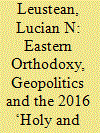

|
|
|
|
|
| Summary/Abstract |
In March 2014, at the time of Russia’s takeover of Crimea, the heads of 14 Orthodox churches convened under the leadership of Ecumenical Patriarch Bartholomew, the Istanbul-based primus inter pares in Eastern Orthodoxy, and announced that a ‘Holy and Great Synod of the Orthodox Church’ would be held in 2016. The Synod, which took place in June 2016 in Crete, was a unique ecclesiastical gathering, bringing together competing geopolitical visions of religion, state and power. This article examines the political mobilisation of Orthodox churches by contextualising the holding of the Synod in relation to Russia’s advancement of spiritual security after the end of the Cold War. It provides a textual analysis of Synodical documents and highlights the patterns of religious and political structures in the contemporary Eastern Orthodox world.
|
|
|
|
|
|
|
|
|
|
|
|
|
|
|
|
| 2 |
ID:
104121
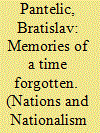

|
|
|
|
|
| Publication |
2011.
|
| Summary/Abstract |
This article questions the persistent view of the Balkans as a place where ethnic and national identities were sustained over centuries of Ottoman and Habsburg rule. It concentrates on the Serbian historical narrative and challenges the picture of the Serbs as an ethnic community who gathered around their bards and priests to cherish memories of their ancient kingdom. Rather, it is argued that we can speak of two competing narratives, one ecclesiastical and the other vernacular, neither of which was even remotely national or historical, and that the Serbs, as we know them today, are not the product of centuries of cultural formation but were carved out of a Slavic mass as were the Croats, relatively recently.
|
|
|
|
|
|
|
|
|
|
|
|
|
|
|
|
| 3 |
ID:
150545
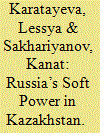

|
|
|
|
|
| Summary/Abstract |
The globalization promoting the growth of interdependence of states that makes relying on the “hard power” increasingly ineffective. Due to increase in competition for the spheres of influence and the capacity to involve individual states and regions in the sphere of one’s economic and political interests is still on the agenda. In this context, the concept of “soft power” has been becoming increasingly popular.
|
|
|
|
|
|
|
|
|
|
|
|
|
|
|
|
| 4 |
ID:
088143
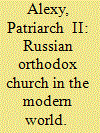

|
|
|
|
|
| Publication |
2009.
|
| Summary/Abstract |
THE INTERNATIONAL ACTIVITY of the Russian Orthodox Church today has four main areas of development. The first priority is to preserve the unity of the Church and ensure the spiritual life of the extensive church diaspora living outside the canonical territory of the Russian Orthodox Church (ROC). The second priority is to develop fraternal relations with all local Orthodox churches. The third priority is of a religious-public nature, and it is to maintain dialogue with other Christian confessions and organizations, as well as with representatives of Islam, Judaism, and Buddhism on matters relating to the preservation of moral values in the modern world. Finally, the fourth priority could be defined as the ROC's cooperation with the foreign policy agencies of various states, as well as with international public and interstate organizations in the interest of preserving peace and the fundamental values of public life.
Presently, the ROC is the largest local church in the Orthodox world. Orthodoxy is not an ethnic religion of Russians, Ukrainians, Belarusians, Moldovans or other peoples. It is global Christianity committed to preserving apostolic faith. It is open to the individual of any ethnic background. The church is a living and tangible embodiment of this principle, since it comprises representatives of numerous nationalities. The ethnic diversity of the Russian Orthodox Church is a source of its vitality and its weal.
One important goal of the Moscow Patriarchy is to preserve and uphold church unity, which is currently being confronted with some challenges. The unity of the church, bequeathed by the apostles, is a great value and should be appreciated as such not only by the bishops but also by each cleric and lay person. Church unity is the treasure that our predecessors preserved despite the ordeals that they had had to go through. This gift, augmented over centuries, cannot be dissipated overnight for the sake of time serving political considerations. Unfortunately, presently, there are ongoing attempts to destroy the sacred space of Holy Rus', created by St. Prince Vladimir, and spread discord and disharmony between millions of Orthodox Russians, Ukrainians, Belarusians, Moldovans, and representatives of other ethnic groups comprising the multiethnic flock of the Russian Orthodox Church
|
|
|
|
|
|
|
|
|
|
|
|
|
|
|
|
| 5 |
ID:
179890
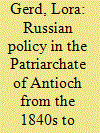

|
|
|
|
|
| Summary/Abstract |
Syria and Lebanon occupied a special place in the competition of the nineteenth-century Great Powers in the Eastern Question. Having entered this struggle, the Russian state used its accustomed routes of influence through the Orthodox Church. This article argues that the traditional practice of sending donations without asking for reports on their usage did not work in the nineteenth and early twentieth centuries. Diplomatic pressure combined with control over the money sent worked better. Confessional instruments of policy thus found new patterns in the age of nationalism. After the Crimean War, Russian imperialism was opposed to the Greek Great Idea in the Balkans and the Middle East; in Syria and Palestine Russian church policy was based on support for the Arabs. All methods of ‘soft power’ (the foundation of schools for the Arab population, attempts to (re)convert the Melkites to Orthodoxy, and gradual Arabisation of the high clergy of the Patriarchate of Antioch) were aimed at putting Syria and Lebanon under Russian control. Unlike in Palestine or Alexandria, this policy was successful: in the first decades of the nineteenth century the Arab Patriarchate of Antioch was completely financed by the Russian government. This article investigates whether the policy of Arabisation could have brought about stability in the region, and whether it really contributed to the realisation of the idea of Orthodox unification under Russian control.
|
|
|
|
|
|
|
|
|
|
|
|
|
|
|
|
| 6 |
ID:
090393
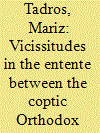

|
|
|
|
|
| Publication |
2009.
|
| Summary/Abstract |
Although some contemporary Egyptian studies have broached aspects of the relationship between the Coptic Orthodox Church and the regime, few have examined developments in the political rapport between the two in the last decade. Important studies have touched on the relationship between the state and church during Nasser's regime, the Sadat years, and the early years of the Mubarak regime, up to the first half of the 1990s. However, there is a paucity of literature on the relationship between the Coptic church and the Egyptian state in the past ten years, a lacuna that this study addresses.
|
|
|
|
|
|
|
|
|
|
|
|
|
|
|
|
|
|
|
|
|